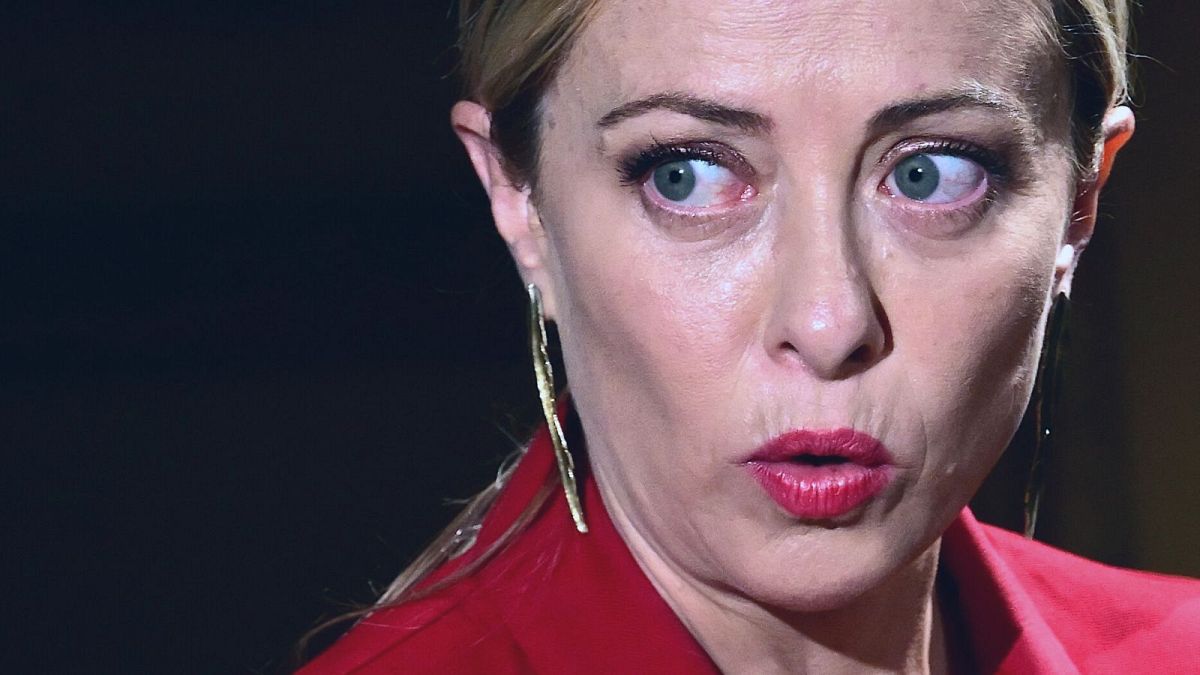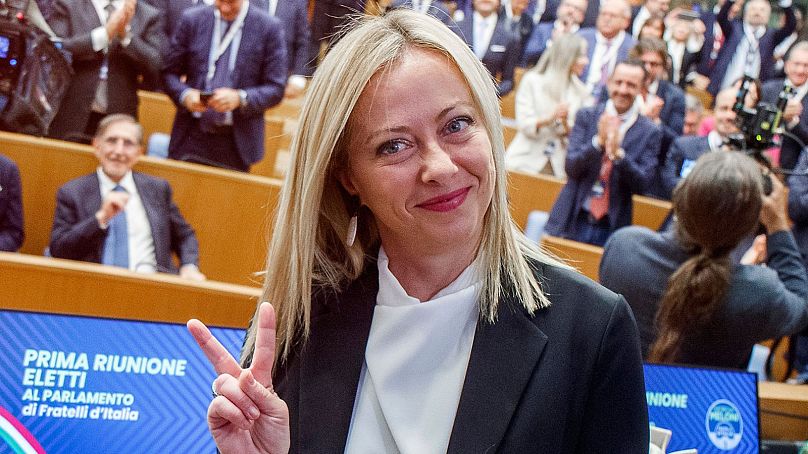It’s been a year since Giorgia Meloni, the leader of the far-right party Brothers of Italy, became the country’s first female prime minister, at the head of a coalition government - but what have they achieved?
It’s been 12 months since Giorgia Meloni, a controversial politician who for years had been a vocal member of the opposition within her post-fascist party Brothers of Italy, became the country’s first woman to cover the role of prime minister.
The worst fears raised after last year’s election results have not turned into reality: the country has not turned its back on Ukraine to embrace a more pro-Putin stance or made any moves to leave the European Union. Any references to Brother of Italy’s fascist roots have been down-played, and Meloni has significantly dialled back her own vitriol against immigrants.
But, as much as the fears that followed the establishment of the most hard-right government in Italy since World War II, many of the changes promised by Meloni have also largely failed to materialise.
Here’s Euronews’ scorecard for the Italian premier’s first year in government. Meloni made a total of 25 promises in her government’s programme, which we’ve grouped by topic.
Stopping illegal immigration: Fail
One of Brother of Italy’s electoral promises was to defend “the country’s frontiers” by creating a naval blockade off the coast of North Africa, an idea that has re-emerged in recent months as the country faced a surge in migrant arrivals on its shores.
This promise, clearly, has not been turned into reality - possibly because it’s legally tricky to implement, if not outright illegal.
A naval blockade can only be created unilaterally by a state in cases of legitimate defence when a war or an act of aggression from another country is involved - situations that don’t apply to the current circumstances.
Italy is not at war with either Libya or Tunisia, the countries of origin of most arrivals and with which the Italian government has actually forged agreements to curb migration.
In general, Meloni’s promises to curb migration have largely failed, leading to the premier’s admission that she had hoped to do better than she actually did.
By mid-October, more than 140,000 migrant arrivals had been registered by Italy’s Interior Ministry so far this year, compared to 70,000 in the same period last year.
But that doesn’t mean that Meloni’s government hasn’t tried to keep its electoral promises - including targeting NGOs which "encourage illegal immigration,” as Brothers of Italy wrote in its programme.
Since the autumn of last year, Meloni’s government has restricted the activities of NGOs and rescue ships, and struck a controversial deal with Tunisia’s President Kais Saied to assist the country in stemming migration. It has also made it easier to evict migrants from the country and send them back to “safe countries” like Tunisia.
For Meloni’s critics, human rights and migrant rights activists, that’s enough harm done.
Spending EU funds promised to Italy: In progress
In 2020, the European Union made available a huge fund of €191.5 billion to Italy to get back on track after the COVID-19 pandemic, called the National Recovery and Resilience Plan or PNRR.
Meloni promised to spend this huge sum without delays and without any waste of money on projects aimed at reforming and updating Italy’s infrastructure. But in April her government was still struggling to find ways to spend the EU funds due to Italy's elephantine bureaucracy and delays at local levels.
While Meloni’s government has indeed started spending some of the EU funds already transferred, inefficiencies at every level of the process made it so that a big slice of the PNRR was still being withheld by the EU this summer.
In late July, Meloni presented a new plan to Brussels to spend the promised money - but the premier is facing an uphill battle before she can spend the entire €191.5 billion promised.
Supporting Italian families and encouraging new births: Pass/In progress
This was the very first point in Meloni’s party’s programme: to increase Italy’s birth rate and support couples wishing to build a family. By this, of course, Meloni meant the traditional, heteronormative family.
The party had promised up to €300 a month for every family during the first year of a child's birth; and up to €260 between the second year and the child’s 18th birthday.
This is something that the Meloni government is still partially working on, having already introduced cheques for families with children but also planning new policies in this direction. In its latest budgetary plan, the government has included one billion euros to be assigned to projects supporting new births in Italy.
New measures include a cheque for families having a third child, fringe benefits up to €2,000 for families with kids, an extra month of parental leave paid at 60% of a worker’s salary and tax deductions for companies hiring new mothers.
“She’s introduced tax benefits and checks for families proportionally to the number of children that they have,” Marianna Griffini, Assistant Professor at Northeastern University London and an expert in Italian politics, told Euronews.
“Meloni even participated in Hungary's summit on demography. She met with Viktor Orban and she was acclaimed as an ideologue by the Hungarian leader, so she’s definitely doubling down on the importance of the traditional family.”
Other, less traditional types of families have on the other hand been punished by the Meloni government, with surrogacy having been made illegal for Italians even outside of the country. During the past year, queer parents across the country have seen their names removed from their children’s certificate, as Italy passed a law saying that only the biological parent of a child can appear on it.
Promoting “Made in Italy,” boosting Italian pride, and relaunching tourism: Pass
Meloni’s government definitely kept its promise to defend the concept of “Made in Italy” and try to boost Italian pride, though that doesn’t mean these efforts received international approval.
Earlier this year, the government pushed forward a controversial measure defending the Italian language and identity against the contamination of English words. The legal initiative would punish the use of foreign words in official communication with fines between €5,000 and €100,000.
“They did very well on this, I think,” said Professor Griffini laughing. “They tried to interfere with linguistic choices, and then they invested in the cultural sector with that ‘fabulous’ project boosting tourism, Open to Meraviglia.”
The project was largely mocked online for putting Botticelli’s Venus in the clothes of a 21st-century influencer as well as for using footage of Slovenia to advertise tourism in Italy. The ad campaign was dead in the water just a few months after launching, sparking an investigation in Italy about potential abuses of public money.
Changing Italy's constitution for the direct election of the country’s president: Fail
One of the promises of Meloni’s party was to fight political instability in Italy by changing the country’s constitution and giving more powers to the president - making Italian politics look a lot more like French politics. With the constitutional reform suggested by Meloni, the Italian president would be elected directly, unlike now, and be a powerful head of state rather than a largely symbolic figure.
Meloni floated this idea earlier this year, but the initiative was strongly opposed by the centre-left opposition, which fears having too much power in a single person.
“They haven’t done much on this, they haven’t done anything on it, actually,” Griffini said. It’s unlikely that Meloni will make more progress on this issue in the coming months and years as opposition is unlikely to dwindle.

